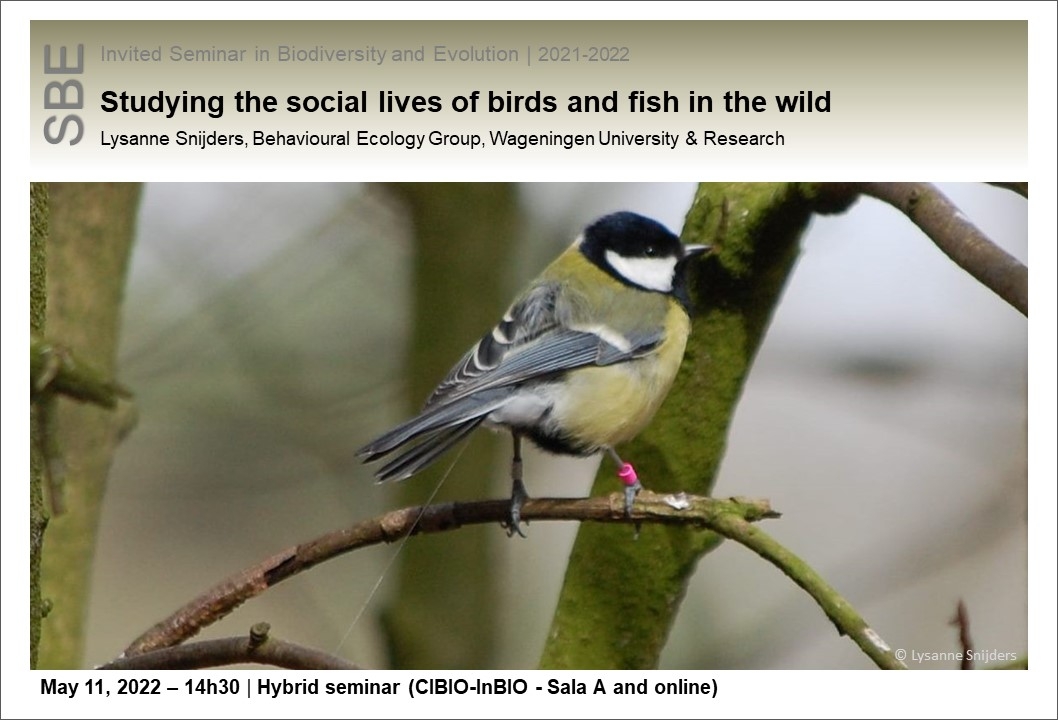Studying the social lives of birds and fish in the wild
11 May 2022 - Lysanne Snijders, Behavioural Ecology Group, Wageningen University & Research | 14h30 | Hybrid seminar

INVITED SEMINAR IN BIODIVERSITY AND EVOLUTION
Sociality is ubiquitous and presents a relevant mechanism through which animals interact with their surroundings. Via their social companions, individuals can receive information on, and access to, resources and threats in their environment. In some cases, social interactions can even generate knowledge about the environment that goes beyond what one individual could know by itself. Intriguingly, within species, we see ample variation in the social tendencies of individual animals. Why do we see this variation and what consequences does it have? Here, I will address these questions, referring to my studies of wild territorial great tits (Parus major) and of wild Trinidadian guppies (Poecilia reticulata). Using an automatic tracking system, personality assays and playback experiments, I studied the social and communication networks of great tits. These studies revealed that slower exploring males occupied less-central social network positions and that sexes responded in a contrasting way to perturbations to the communication network. To study wild guppies, I did not use novel technology, but instead relied on real-time focal observations in combination with food-provisioning experiments and (social) environment manipulations. These studies showed that more social individuals enjoyed greater foraging success and demonstrated the facilitating effects of group size and composition. In summary, animal personality explained variation in the social connectivity of individual territorial songbirds, while variation in social connectivity influenced the foraging success of individual fish in the wild. Furthermore, I hope these studies illustrate the important roles of both classic and novel methodology to gain relevant new insights into the hidden social lives of wild animals.
Lysanne Snijders is Assistant Professor at the Behavioural Ecology Group of Wageningen University (the Netherlands). She studies how individuals of the same species differ in their behaviour and how these differences impact the social and spatial dynamics of animal populations. Her research includes birds, bats and fish. Lysanne finished her PhD, with distinction, at the Behavioural Ecology Group of Wageningen University and NIOO-KNAW, studying the role of personality in territorial great tit networks. Next, she worked as a postdoc-fellow at the Leibniz-Institute of Freshwater Ecology and Inland Fisheries (IGB, Germany) studying social foraging in wild guppies and as a postdoc-fellow at the Leibniz-Institute for Zoo and Wildlife Research (IZW, Germany) studying personality and migration strategies in tree-roosting bats. In 2020, she returned to Wageningen to further explore the social foraging dynamics of wild guppies. In addition to gaining exciting new fundamental insights in animal behaviour, Lysanne is interested in how knowledge of animal behaviour can contribute to wildlife conservation. For her early-career research, she was awarded the 2020 Niko Tinbergen Award by the Ethologische Gesellschaft.
[Host: Gonçalo Cardoso, Behavioural Ecology - BE]